Discuss and Evaluate Psychological Research in Criminal Justice
VerifiedAdded on 2023/01/11
|9
|2602
|72
Report
AI Summary
This report provides a comprehensive overview of the application of psychological research within the criminal justice system. It begins by defining criminal justice and highlighting its role in preventing crime through the rehabilitation of offenders. The report delves into the concept of false confessions, exploring their causes, including manipulative interrogation techniques and the vulnerabilities of suspects. It examines different types of false confessions: voluntary, compliant, and internalized. The report also discusses interrogation methods, contrasting information-gathering and accusatorial approaches, and emphasizes the effectiveness of the PEACE model in minimizing false confessions. Furthermore, it identifies factors contributing to false confessions, such as mental disorders and police techniques, and suggests measures like video recording interrogations and protecting vulnerable suspects to mitigate these issues. The report concludes by reiterating the importance of psychological research in improving criminal justice practices and proposes the use of the PEACE model and breaks during interrogation to minimize false confessions.

Forensic Psychology
Contents
1
Contents
1
Paraphrase This Document
Need a fresh take? Get an instant paraphrase of this document with our AI Paraphraser

INTRODUCTION...........................................................................................................................3
MAIN BODY...................................................................................................................................3
Discuss and evaluate how psychological research can be applied to criminal justice practice
................................................................................................................................................3
CONCLUSION................................................................................................................................7
REFERENCES................................................................................................................................8
2
MAIN BODY...................................................................................................................................3
Discuss and evaluate how psychological research can be applied to criminal justice practice
................................................................................................................................................3
CONCLUSION................................................................................................................................7
REFERENCES................................................................................................................................8
2
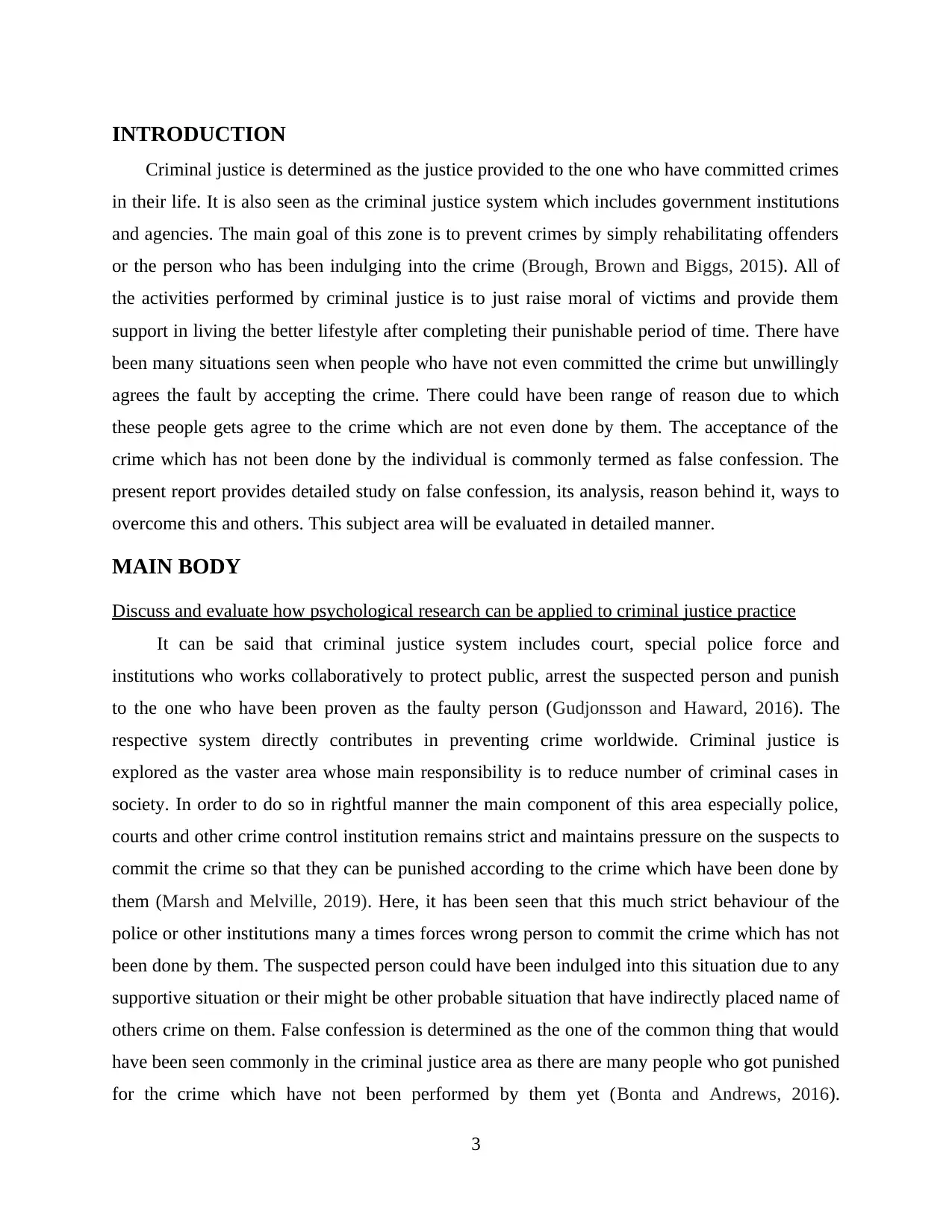
INTRODUCTION
Criminal justice is determined as the justice provided to the one who have committed crimes
in their life. It is also seen as the criminal justice system which includes government institutions
and agencies. The main goal of this zone is to prevent crimes by simply rehabilitating offenders
or the person who has been indulging into the crime (Brough, Brown and Biggs, 2015). All of
the activities performed by criminal justice is to just raise moral of victims and provide them
support in living the better lifestyle after completing their punishable period of time. There have
been many situations seen when people who have not even committed the crime but unwillingly
agrees the fault by accepting the crime. There could have been range of reason due to which
these people gets agree to the crime which are not even done by them. The acceptance of the
crime which has not been done by the individual is commonly termed as false confession. The
present report provides detailed study on false confession, its analysis, reason behind it, ways to
overcome this and others. This subject area will be evaluated in detailed manner.
MAIN BODY
Discuss and evaluate how psychological research can be applied to criminal justice practice
It can be said that criminal justice system includes court, special police force and
institutions who works collaboratively to protect public, arrest the suspected person and punish
to the one who have been proven as the faulty person (Gudjonsson and Haward, 2016). The
respective system directly contributes in preventing crime worldwide. Criminal justice is
explored as the vaster area whose main responsibility is to reduce number of criminal cases in
society. In order to do so in rightful manner the main component of this area especially police,
courts and other crime control institution remains strict and maintains pressure on the suspects to
commit the crime so that they can be punished according to the crime which have been done by
them (Marsh and Melville, 2019). Here, it has been seen that this much strict behaviour of the
police or other institutions many a times forces wrong person to commit the crime which has not
been done by them. The suspected person could have been indulged into this situation due to any
supportive situation or their might be other probable situation that have indirectly placed name of
others crime on them. False confession is determined as the one of the common thing that would
have been seen commonly in the criminal justice area as there are many people who got punished
for the crime which have not been performed by them yet (Bonta and Andrews, 2016).
3
Criminal justice is determined as the justice provided to the one who have committed crimes
in their life. It is also seen as the criminal justice system which includes government institutions
and agencies. The main goal of this zone is to prevent crimes by simply rehabilitating offenders
or the person who has been indulging into the crime (Brough, Brown and Biggs, 2015). All of
the activities performed by criminal justice is to just raise moral of victims and provide them
support in living the better lifestyle after completing their punishable period of time. There have
been many situations seen when people who have not even committed the crime but unwillingly
agrees the fault by accepting the crime. There could have been range of reason due to which
these people gets agree to the crime which are not even done by them. The acceptance of the
crime which has not been done by the individual is commonly termed as false confession. The
present report provides detailed study on false confession, its analysis, reason behind it, ways to
overcome this and others. This subject area will be evaluated in detailed manner.
MAIN BODY
Discuss and evaluate how psychological research can be applied to criminal justice practice
It can be said that criminal justice system includes court, special police force and
institutions who works collaboratively to protect public, arrest the suspected person and punish
to the one who have been proven as the faulty person (Gudjonsson and Haward, 2016). The
respective system directly contributes in preventing crime worldwide. Criminal justice is
explored as the vaster area whose main responsibility is to reduce number of criminal cases in
society. In order to do so in rightful manner the main component of this area especially police,
courts and other crime control institution remains strict and maintains pressure on the suspects to
commit the crime so that they can be punished according to the crime which have been done by
them (Marsh and Melville, 2019). Here, it has been seen that this much strict behaviour of the
police or other institutions many a times forces wrong person to commit the crime which has not
been done by them. The suspected person could have been indulged into this situation due to any
supportive situation or their might be other probable situation that have indirectly placed name of
others crime on them. False confession is determined as the one of the common thing that would
have been seen commonly in the criminal justice area as there are many people who got punished
for the crime which have not been performed by them yet (Bonta and Andrews, 2016).
3
⊘ This is a preview!⊘
Do you want full access?
Subscribe today to unlock all pages.

Trusted by 1+ million students worldwide
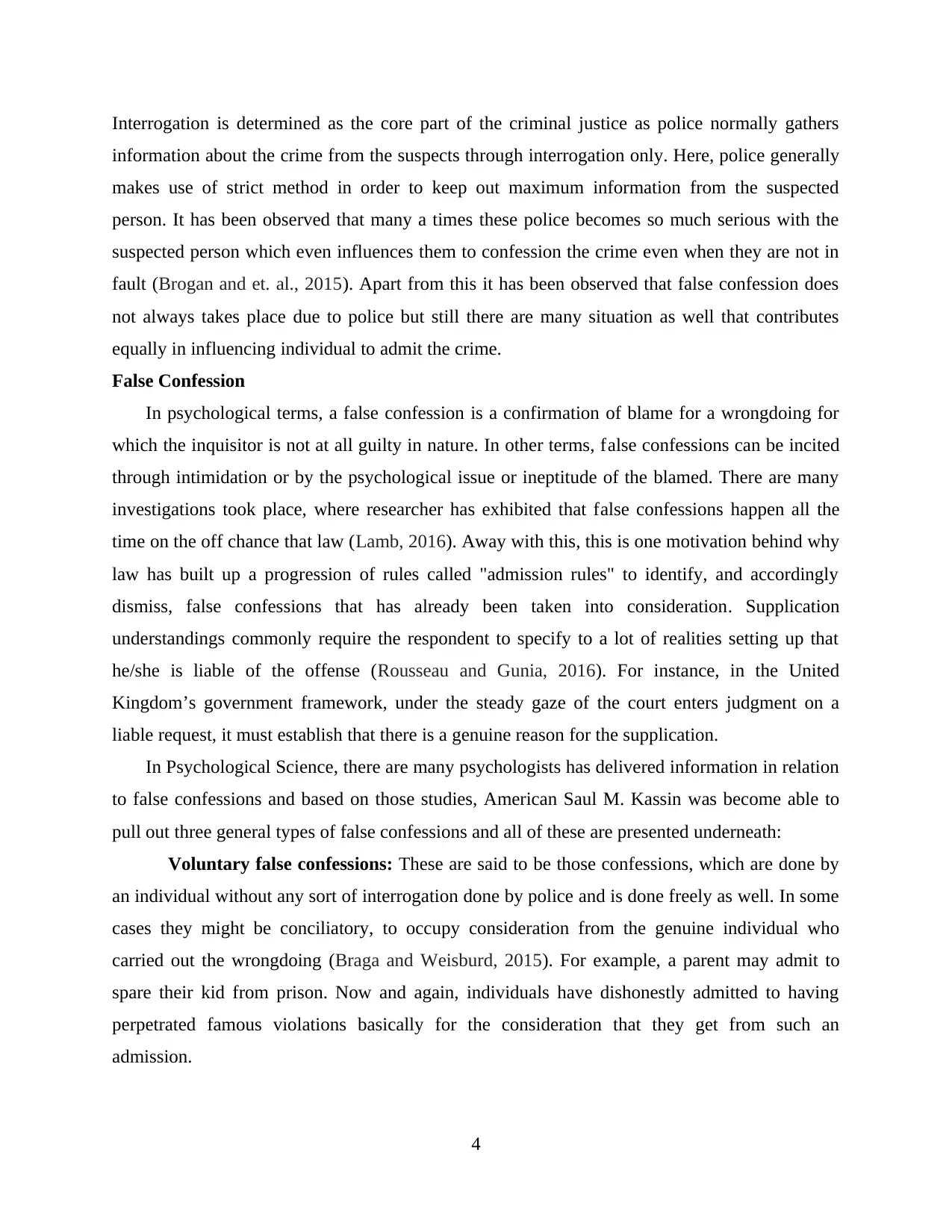
Interrogation is determined as the core part of the criminal justice as police normally gathers
information about the crime from the suspects through interrogation only. Here, police generally
makes use of strict method in order to keep out maximum information from the suspected
person. It has been observed that many a times these police becomes so much serious with the
suspected person which even influences them to confession the crime even when they are not in
fault (Brogan and et. al., 2015). Apart from this it has been observed that false confession does
not always takes place due to police but still there are many situation as well that contributes
equally in influencing individual to admit the crime.
False Confession
In psychological terms, a false confession is a confirmation of blame for a wrongdoing for
which the inquisitor is not at all guilty in nature. In other terms, false confessions can be incited
through intimidation or by the psychological issue or ineptitude of the blamed. There are many
investigations took place, where researcher has exhibited that false confessions happen all the
time on the off chance that law (Lamb, 2016). Away with this, this is one motivation behind why
law has built up a progression of rules called "admission rules" to identify, and accordingly
dismiss, false confessions that has already been taken into consideration. Supplication
understandings commonly require the respondent to specify to a lot of realities setting up that
he/she is liable of the offense (Rousseau and Gunia, 2016). For instance, in the United
Kingdom’s government framework, under the steady gaze of the court enters judgment on a
liable request, it must establish that there is a genuine reason for the supplication.
In Psychological Science, there are many psychologists has delivered information in relation
to false confessions and based on those studies, American Saul M. Kassin was become able to
pull out three general types of false confessions and all of these are presented underneath:
Voluntary false confessions: These are said to be those confessions, which are done by
an individual without any sort of interrogation done by police and is done freely as well. In some
cases they might be conciliatory, to occupy consideration from the genuine individual who
carried out the wrongdoing (Braga and Weisburd, 2015). For example, a parent may admit to
spare their kid from prison. Now and again, individuals have dishonestly admitted to having
perpetrated famous violations basically for the consideration that they get from such an
admission.
4
information about the crime from the suspects through interrogation only. Here, police generally
makes use of strict method in order to keep out maximum information from the suspected
person. It has been observed that many a times these police becomes so much serious with the
suspected person which even influences them to confession the crime even when they are not in
fault (Brogan and et. al., 2015). Apart from this it has been observed that false confession does
not always takes place due to police but still there are many situation as well that contributes
equally in influencing individual to admit the crime.
False Confession
In psychological terms, a false confession is a confirmation of blame for a wrongdoing for
which the inquisitor is not at all guilty in nature. In other terms, false confessions can be incited
through intimidation or by the psychological issue or ineptitude of the blamed. There are many
investigations took place, where researcher has exhibited that false confessions happen all the
time on the off chance that law (Lamb, 2016). Away with this, this is one motivation behind why
law has built up a progression of rules called "admission rules" to identify, and accordingly
dismiss, false confessions that has already been taken into consideration. Supplication
understandings commonly require the respondent to specify to a lot of realities setting up that
he/she is liable of the offense (Rousseau and Gunia, 2016). For instance, in the United
Kingdom’s government framework, under the steady gaze of the court enters judgment on a
liable request, it must establish that there is a genuine reason for the supplication.
In Psychological Science, there are many psychologists has delivered information in relation
to false confessions and based on those studies, American Saul M. Kassin was become able to
pull out three general types of false confessions and all of these are presented underneath:
Voluntary false confessions: These are said to be those confessions, which are done by
an individual without any sort of interrogation done by police and is done freely as well. In some
cases they might be conciliatory, to occupy consideration from the genuine individual who
carried out the wrongdoing (Braga and Weisburd, 2015). For example, a parent may admit to
spare their kid from prison. Now and again, individuals have dishonestly admitted to having
perpetrated famous violations basically for the consideration that they get from such an
admission.
4
Paraphrase This Document
Need a fresh take? Get an instant paraphrase of this document with our AI Paraphraser
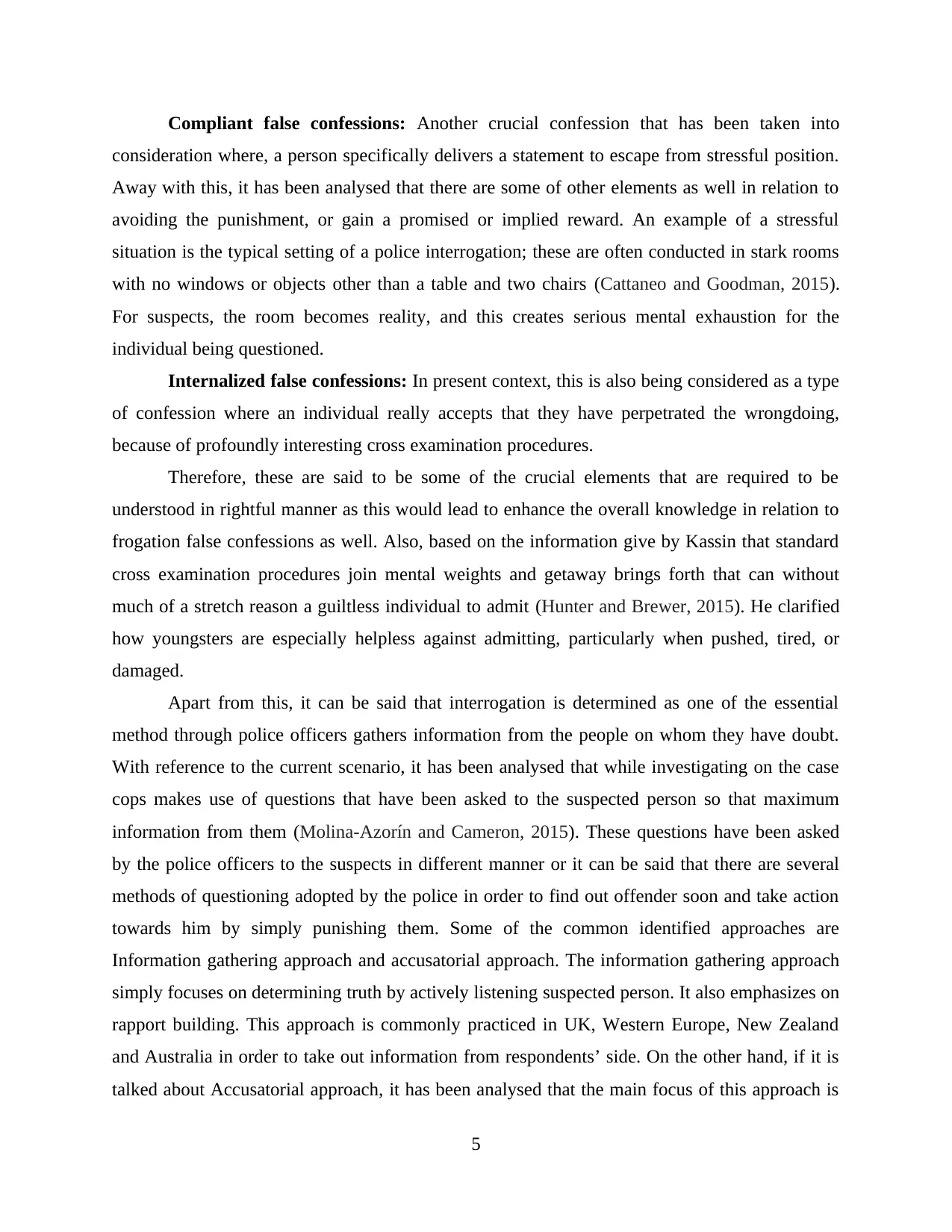
Compliant false confessions: Another crucial confession that has been taken into
consideration where, a person specifically delivers a statement to escape from stressful position.
Away with this, it has been analysed that there are some of other elements as well in relation to
avoiding the punishment, or gain a promised or implied reward. An example of a stressful
situation is the typical setting of a police interrogation; these are often conducted in stark rooms
with no windows or objects other than a table and two chairs (Cattaneo and Goodman, 2015).
For suspects, the room becomes reality, and this creates serious mental exhaustion for the
individual being questioned.
Internalized false confessions: In present context, this is also being considered as a type
of confession where an individual really accepts that they have perpetrated the wrongdoing,
because of profoundly interesting cross examination procedures.
Therefore, these are said to be some of the crucial elements that are required to be
understood in rightful manner as this would lead to enhance the overall knowledge in relation to
frogation false confessions as well. Also, based on the information give by Kassin that standard
cross examination procedures join mental weights and getaway brings forth that can without
much of a stretch reason a guiltless individual to admit (Hunter and Brewer, 2015). He clarified
how youngsters are especially helpless against admitting, particularly when pushed, tired, or
damaged.
Apart from this, it can be said that interrogation is determined as one of the essential
method through police officers gathers information from the people on whom they have doubt.
With reference to the current scenario, it has been analysed that while investigating on the case
cops makes use of questions that have been asked to the suspected person so that maximum
information from them (Molina-Azorín and Cameron, 2015). These questions have been asked
by the police officers to the suspects in different manner or it can be said that there are several
methods of questioning adopted by the police in order to find out offender soon and take action
towards him by simply punishing them. Some of the common identified approaches are
Information gathering approach and accusatorial approach. The information gathering approach
simply focuses on determining truth by actively listening suspected person. It also emphasizes on
rapport building. This approach is commonly practiced in UK, Western Europe, New Zealand
and Australia in order to take out information from respondents’ side. On the other hand, if it is
talked about Accusatorial approach, it has been analysed that the main focus of this approach is
5
consideration where, a person specifically delivers a statement to escape from stressful position.
Away with this, it has been analysed that there are some of other elements as well in relation to
avoiding the punishment, or gain a promised or implied reward. An example of a stressful
situation is the typical setting of a police interrogation; these are often conducted in stark rooms
with no windows or objects other than a table and two chairs (Cattaneo and Goodman, 2015).
For suspects, the room becomes reality, and this creates serious mental exhaustion for the
individual being questioned.
Internalized false confessions: In present context, this is also being considered as a type
of confession where an individual really accepts that they have perpetrated the wrongdoing,
because of profoundly interesting cross examination procedures.
Therefore, these are said to be some of the crucial elements that are required to be
understood in rightful manner as this would lead to enhance the overall knowledge in relation to
frogation false confessions as well. Also, based on the information give by Kassin that standard
cross examination procedures join mental weights and getaway brings forth that can without
much of a stretch reason a guiltless individual to admit (Hunter and Brewer, 2015). He clarified
how youngsters are especially helpless against admitting, particularly when pushed, tired, or
damaged.
Apart from this, it can be said that interrogation is determined as one of the essential
method through police officers gathers information from the people on whom they have doubt.
With reference to the current scenario, it has been analysed that while investigating on the case
cops makes use of questions that have been asked to the suspected person so that maximum
information from them (Molina-Azorín and Cameron, 2015). These questions have been asked
by the police officers to the suspects in different manner or it can be said that there are several
methods of questioning adopted by the police in order to find out offender soon and take action
towards him by simply punishing them. Some of the common identified approaches are
Information gathering approach and accusatorial approach. The information gathering approach
simply focuses on determining truth by actively listening suspected person. It also emphasizes on
rapport building. This approach is commonly practiced in UK, Western Europe, New Zealand
and Australia in order to take out information from respondents’ side. On the other hand, if it is
talked about Accusatorial approach, it has been analysed that the main focus of this approach is
5
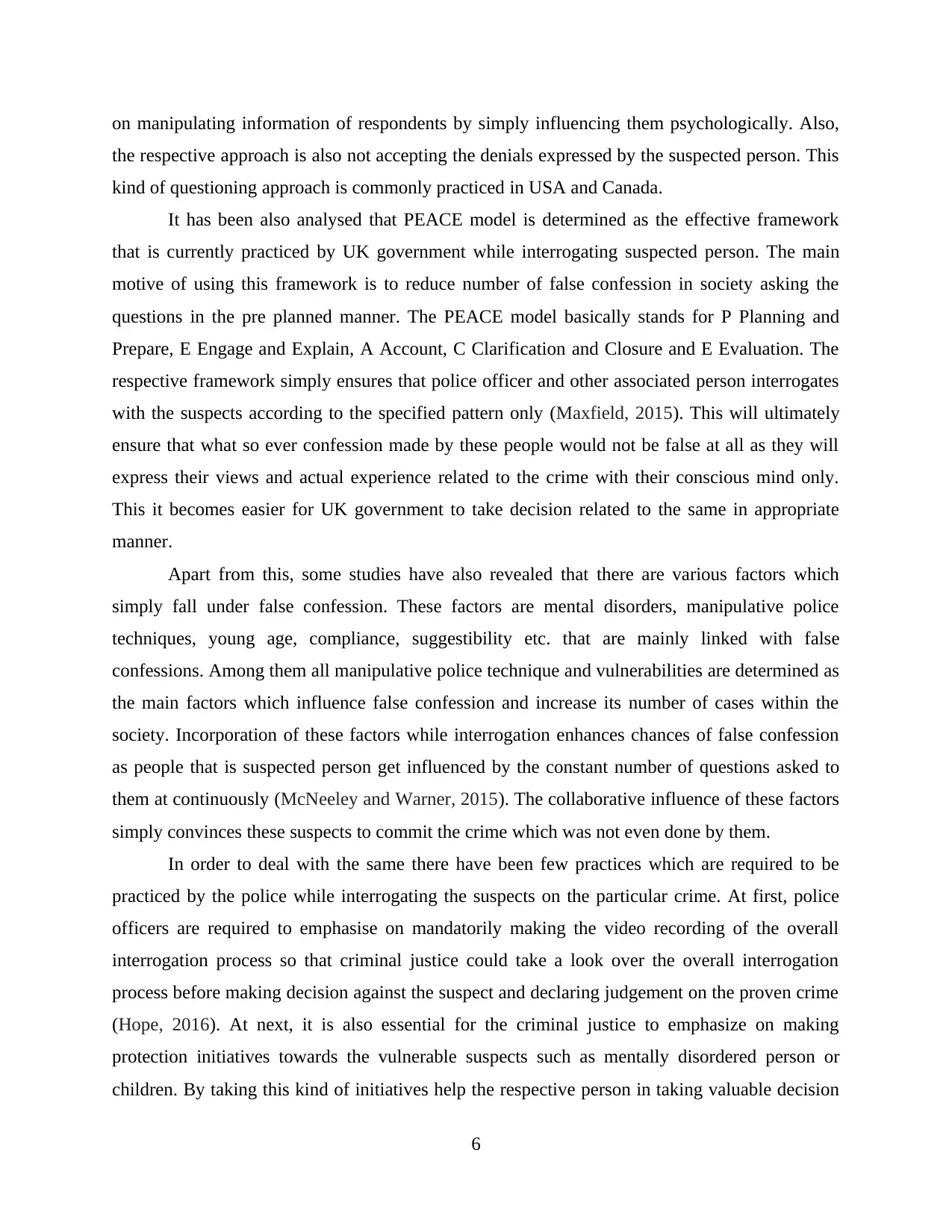
on manipulating information of respondents by simply influencing them psychologically. Also,
the respective approach is also not accepting the denials expressed by the suspected person. This
kind of questioning approach is commonly practiced in USA and Canada.
It has been also analysed that PEACE model is determined as the effective framework
that is currently practiced by UK government while interrogating suspected person. The main
motive of using this framework is to reduce number of false confession in society asking the
questions in the pre planned manner. The PEACE model basically stands for P Planning and
Prepare, E Engage and Explain, A Account, C Clarification and Closure and E Evaluation. The
respective framework simply ensures that police officer and other associated person interrogates
with the suspects according to the specified pattern only (Maxfield, 2015). This will ultimately
ensure that what so ever confession made by these people would not be false at all as they will
express their views and actual experience related to the crime with their conscious mind only.
This it becomes easier for UK government to take decision related to the same in appropriate
manner.
Apart from this, some studies have also revealed that there are various factors which
simply fall under false confession. These factors are mental disorders, manipulative police
techniques, young age, compliance, suggestibility etc. that are mainly linked with false
confessions. Among them all manipulative police technique and vulnerabilities are determined as
the main factors which influence false confession and increase its number of cases within the
society. Incorporation of these factors while interrogation enhances chances of false confession
as people that is suspected person get influenced by the constant number of questions asked to
them at continuously (McNeeley and Warner, 2015). The collaborative influence of these factors
simply convinces these suspects to commit the crime which was not even done by them.
In order to deal with the same there have been few practices which are required to be
practiced by the police while interrogating the suspects on the particular crime. At first, police
officers are required to emphasise on mandatorily making the video recording of the overall
interrogation process so that criminal justice could take a look over the overall interrogation
process before making decision against the suspect and declaring judgement on the proven crime
(Hope, 2016). At next, it is also essential for the criminal justice to emphasize on making
protection initiatives towards the vulnerable suspects such as mentally disordered person or
children. By taking this kind of initiatives help the respective person in taking valuable decision
6
the respective approach is also not accepting the denials expressed by the suspected person. This
kind of questioning approach is commonly practiced in USA and Canada.
It has been also analysed that PEACE model is determined as the effective framework
that is currently practiced by UK government while interrogating suspected person. The main
motive of using this framework is to reduce number of false confession in society asking the
questions in the pre planned manner. The PEACE model basically stands for P Planning and
Prepare, E Engage and Explain, A Account, C Clarification and Closure and E Evaluation. The
respective framework simply ensures that police officer and other associated person interrogates
with the suspects according to the specified pattern only (Maxfield, 2015). This will ultimately
ensure that what so ever confession made by these people would not be false at all as they will
express their views and actual experience related to the crime with their conscious mind only.
This it becomes easier for UK government to take decision related to the same in appropriate
manner.
Apart from this, some studies have also revealed that there are various factors which
simply fall under false confession. These factors are mental disorders, manipulative police
techniques, young age, compliance, suggestibility etc. that are mainly linked with false
confessions. Among them all manipulative police technique and vulnerabilities are determined as
the main factors which influence false confession and increase its number of cases within the
society. Incorporation of these factors while interrogation enhances chances of false confession
as people that is suspected person get influenced by the constant number of questions asked to
them at continuously (McNeeley and Warner, 2015). The collaborative influence of these factors
simply convinces these suspects to commit the crime which was not even done by them.
In order to deal with the same there have been few practices which are required to be
practiced by the police while interrogating the suspects on the particular crime. At first, police
officers are required to emphasise on mandatorily making the video recording of the overall
interrogation process so that criminal justice could take a look over the overall interrogation
process before making decision against the suspect and declaring judgement on the proven crime
(Hope, 2016). At next, it is also essential for the criminal justice to emphasize on making
protection initiatives towards the vulnerable suspects such as mentally disordered person or
children. By taking this kind of initiatives help the respective person in taking valuable decision
6
⊘ This is a preview!⊘
Do you want full access?
Subscribe today to unlock all pages.

Trusted by 1+ million students worldwide
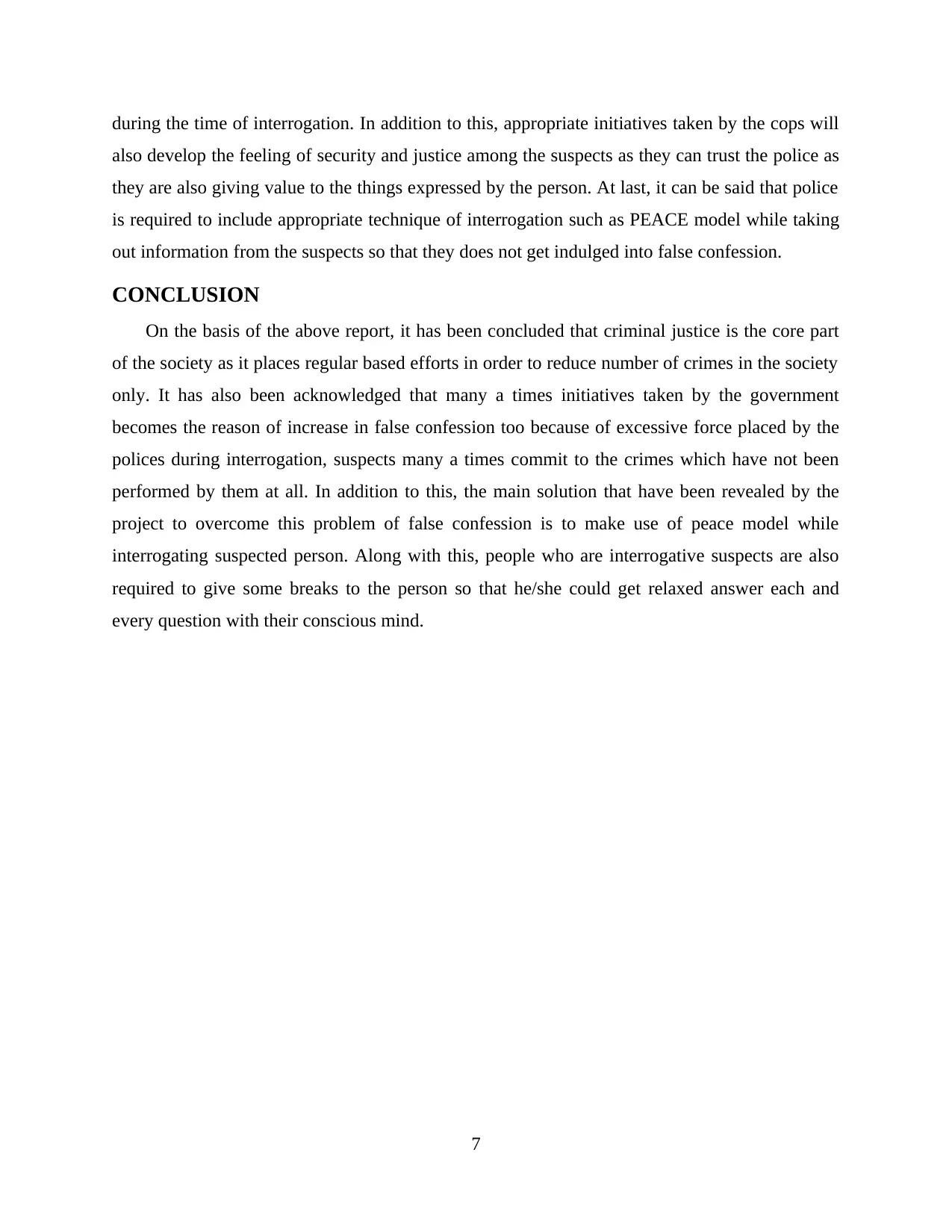
during the time of interrogation. In addition to this, appropriate initiatives taken by the cops will
also develop the feeling of security and justice among the suspects as they can trust the police as
they are also giving value to the things expressed by the person. At last, it can be said that police
is required to include appropriate technique of interrogation such as PEACE model while taking
out information from the suspects so that they does not get indulged into false confession.
CONCLUSION
On the basis of the above report, it has been concluded that criminal justice is the core part
of the society as it places regular based efforts in order to reduce number of crimes in the society
only. It has also been acknowledged that many a times initiatives taken by the government
becomes the reason of increase in false confession too because of excessive force placed by the
polices during interrogation, suspects many a times commit to the crimes which have not been
performed by them at all. In addition to this, the main solution that have been revealed by the
project to overcome this problem of false confession is to make use of peace model while
interrogating suspected person. Along with this, people who are interrogative suspects are also
required to give some breaks to the person so that he/she could get relaxed answer each and
every question with their conscious mind.
7
also develop the feeling of security and justice among the suspects as they can trust the police as
they are also giving value to the things expressed by the person. At last, it can be said that police
is required to include appropriate technique of interrogation such as PEACE model while taking
out information from the suspects so that they does not get indulged into false confession.
CONCLUSION
On the basis of the above report, it has been concluded that criminal justice is the core part
of the society as it places regular based efforts in order to reduce number of crimes in the society
only. It has also been acknowledged that many a times initiatives taken by the government
becomes the reason of increase in false confession too because of excessive force placed by the
polices during interrogation, suspects many a times commit to the crimes which have not been
performed by them at all. In addition to this, the main solution that have been revealed by the
project to overcome this problem of false confession is to make use of peace model while
interrogating suspected person. Along with this, people who are interrogative suspects are also
required to give some breaks to the person so that he/she could get relaxed answer each and
every question with their conscious mind.
7
Paraphrase This Document
Need a fresh take? Get an instant paraphrase of this document with our AI Paraphraser
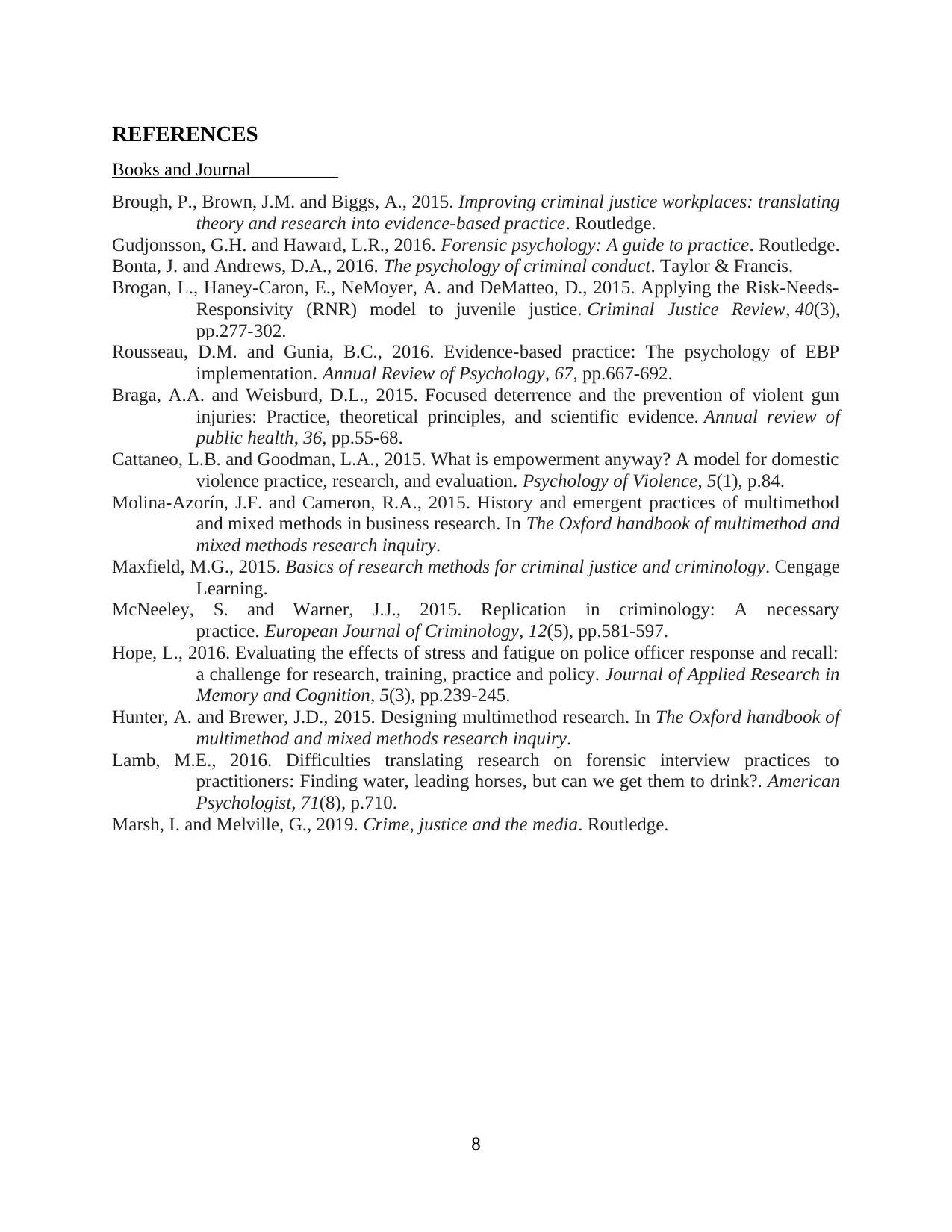
REFERENCES
Books and Journal
Brough, P., Brown, J.M. and Biggs, A., 2015. Improving criminal justice workplaces: translating
theory and research into evidence-based practice. Routledge.
Gudjonsson, G.H. and Haward, L.R., 2016. Forensic psychology: A guide to practice. Routledge.
Bonta, J. and Andrews, D.A., 2016. The psychology of criminal conduct. Taylor & Francis.
Brogan, L., Haney-Caron, E., NeMoyer, A. and DeMatteo, D., 2015. Applying the Risk-Needs-
Responsivity (RNR) model to juvenile justice. Criminal Justice Review, 40(3),
pp.277-302.
Rousseau, D.M. and Gunia, B.C., 2016. Evidence-based practice: The psychology of EBP
implementation. Annual Review of Psychology, 67, pp.667-692.
Braga, A.A. and Weisburd, D.L., 2015. Focused deterrence and the prevention of violent gun
injuries: Practice, theoretical principles, and scientific evidence. Annual review of
public health, 36, pp.55-68.
Cattaneo, L.B. and Goodman, L.A., 2015. What is empowerment anyway? A model for domestic
violence practice, research, and evaluation. Psychology of Violence, 5(1), p.84.
Molina-Azorín, J.F. and Cameron, R.A., 2015. History and emergent practices of multimethod
and mixed methods in business research. In The Oxford handbook of multimethod and
mixed methods research inquiry.
Maxfield, M.G., 2015. Basics of research methods for criminal justice and criminology. Cengage
Learning.
McNeeley, S. and Warner, J.J., 2015. Replication in criminology: A necessary
practice. European Journal of Criminology, 12(5), pp.581-597.
Hope, L., 2016. Evaluating the effects of stress and fatigue on police officer response and recall:
a challenge for research, training, practice and policy. Journal of Applied Research in
Memory and Cognition, 5(3), pp.239-245.
Hunter, A. and Brewer, J.D., 2015. Designing multimethod research. In The Oxford handbook of
multimethod and mixed methods research inquiry.
Lamb, M.E., 2016. Difficulties translating research on forensic interview practices to
practitioners: Finding water, leading horses, but can we get them to drink?. American
Psychologist, 71(8), p.710.
Marsh, I. and Melville, G., 2019. Crime, justice and the media. Routledge.
8
Books and Journal
Brough, P., Brown, J.M. and Biggs, A., 2015. Improving criminal justice workplaces: translating
theory and research into evidence-based practice. Routledge.
Gudjonsson, G.H. and Haward, L.R., 2016. Forensic psychology: A guide to practice. Routledge.
Bonta, J. and Andrews, D.A., 2016. The psychology of criminal conduct. Taylor & Francis.
Brogan, L., Haney-Caron, E., NeMoyer, A. and DeMatteo, D., 2015. Applying the Risk-Needs-
Responsivity (RNR) model to juvenile justice. Criminal Justice Review, 40(3),
pp.277-302.
Rousseau, D.M. and Gunia, B.C., 2016. Evidence-based practice: The psychology of EBP
implementation. Annual Review of Psychology, 67, pp.667-692.
Braga, A.A. and Weisburd, D.L., 2015. Focused deterrence and the prevention of violent gun
injuries: Practice, theoretical principles, and scientific evidence. Annual review of
public health, 36, pp.55-68.
Cattaneo, L.B. and Goodman, L.A., 2015. What is empowerment anyway? A model for domestic
violence practice, research, and evaluation. Psychology of Violence, 5(1), p.84.
Molina-Azorín, J.F. and Cameron, R.A., 2015. History and emergent practices of multimethod
and mixed methods in business research. In The Oxford handbook of multimethod and
mixed methods research inquiry.
Maxfield, M.G., 2015. Basics of research methods for criminal justice and criminology. Cengage
Learning.
McNeeley, S. and Warner, J.J., 2015. Replication in criminology: A necessary
practice. European Journal of Criminology, 12(5), pp.581-597.
Hope, L., 2016. Evaluating the effects of stress and fatigue on police officer response and recall:
a challenge for research, training, practice and policy. Journal of Applied Research in
Memory and Cognition, 5(3), pp.239-245.
Hunter, A. and Brewer, J.D., 2015. Designing multimethod research. In The Oxford handbook of
multimethod and mixed methods research inquiry.
Lamb, M.E., 2016. Difficulties translating research on forensic interview practices to
practitioners: Finding water, leading horses, but can we get them to drink?. American
Psychologist, 71(8), p.710.
Marsh, I. and Melville, G., 2019. Crime, justice and the media. Routledge.
8

9
⊘ This is a preview!⊘
Do you want full access?
Subscribe today to unlock all pages.

Trusted by 1+ million students worldwide
1 out of 9
Related Documents
Your All-in-One AI-Powered Toolkit for Academic Success.
+13062052269
info@desklib.com
Available 24*7 on WhatsApp / Email
![[object Object]](/_next/static/media/star-bottom.7253800d.svg)
Unlock your academic potential
Copyright © 2020–2026 A2Z Services. All Rights Reserved. Developed and managed by ZUCOL.





